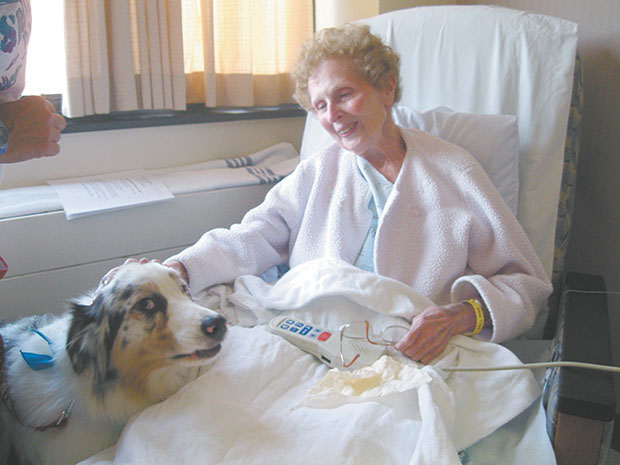
Submitted by Peoria County Animal Protection Service
Pet Therapy (PTA) or Animal Assisted Activities (AAA): Opportunities for
motivational, educational, recreational, and/or therapeutic benefits to
enhance quality of life. PTA or AAA are delivered in a variety of
environments by specially trained professionals, paraprofessionals,
and/or volunteers, in association with animals that meet specific
criteria. (From Standards of Practice to Animal Assisted Activities and
Therapy.)
Recently, one of the most memorable activities that occurred when the
tornadoes affected the greater Peoria area was the use of animals to
offer support and relief to families displaced. The Peoria Humane
Society’s Special Pals pet therapy program helped to alleviate some
anxieties and provide comfort to people suffering from the horror of
losing their homes. Volunteers and their therapy dogs visited the
Multi-Agency Resource Center where affected families and even relief
workers could spend time with and benefit from the interaction with
dogs.
Those who work with therapy animals can provide countless stories of the
tremendously positive affect being around pets can provide. In nursing
homes, residents who don’t respond to other people will come alive when
visited by a pet. In hospitals, visiting animals can spur people,
particularly children, to heal faster and work harder. Even in detention
centers, animals will inspire those with behavioral issues or criminal
histories to demonstrate empathy for others that may long have been
lost.
These programs dramatically improve the lives of people in many ways.
Fortunately, the Peoria area has a well-established pet therapy activity
program. The Peoria Humane Society’s Special Pals program was created
in 1985 and has grown tremendously since that time. Trained volunteers
visit area nursing homes and other residential care facilities,
hospitals, and schools with their dogs offering companionship and
enrichment. All of the dogs used get tested and approved as therapy
dogs; the pets come in all shapes and sizes from the smallest Shih Tzu
to the giant Mastiff. Special Pals averages 25 visits each month with
more than 40 active volunteers and their dogs.
Special Pals also offers a literacy program called Reading to Dogs. Held
in libraries, schools, and even area bookstores, individual children
are paired with a dog and a book of their choosing. As the children read
the book to “their” dog, they experience non-judgmental and
unconditional support. Parents rave about this program and share many
success stories made possible by these animals. Children, who have
struggled with reading, blossom when they form a bond with a therapy dog
that listens and gives silent encouragement. Special Pals even provides
comfort and support to college age students. During finals week,
therapy dogs visit local colleges and universities to offer
encouragement to stressed-out students.
Our pets benefit from these activities as well. Not only does the visit
provide an owner with a fun, helpful activity to do with their dog, but
the dogs also appreciate the socialization and interaction with people
in need. Some dogs even seem to sense exactly what the person may need
and will often provide that precise interaction — a lick, a soft nuzzle,
or a simple trick. Of course, the handler also gains from these
activities. The volunteer’s time with their pet is meaningful, and the
visits offer owners the opportunity to meet new people, help others, and
spend positive time with their dogs.
“We’re always in need of volunteers and special dogs to join the Special
Pals program” says Kitty Yanko of the Peoria Humane Society. “Our
volunteers are wonderful, but the demand for therapy dog visits has
exploded. People see the value of these special dogs and their owners!”
Therapy dogs don’t necessarily require special training; but they do
need to be social, friendly, quiet and calm, and well mannered. Because
they may be working in groups, the dogs should be accepting and tolerant
of other dogs and all types of people. After an assessment by therapy
dog testers, a potential candidate is then observed on several visits
before final approval as a certified therapy dog. Such certification
provides benefits and protection for the dog and the owner.
“Being a pet therapy volunteer is a great way to give back to the
community while spending quality time with your dog,” says Yanko.
“You’ll be amazed at how rewarding it can be to make such a difference
in a person’s life with your special friend.”
If you think your pet would enjoy acting as a therapy dog, and you’d
like to volunteer for any of these activities, contact Kitty Yanko at
the Peoria Humane Society at kyanko@peoriahs.org or 309-672-2447 or
visit the website at www.peoriahs.org.
Photo courtesy of Peoria County Animal Protection Services
Benefits of Pet Therapy
Pet therapy promotes physical well-being by:
- Lowering blood pressure
- Improving cardiovascular health
- Releasing endorphins for a calming effect
- Diminishing overall physical pain
- Producing an automatic relaxation response
It also improves mental health by:
- Helping to alleviate depression, loneliness and
boredom - Reducing feelings of anxiety, isolation and alienation
- Increasing self esteem and socialization
- Providing comfort, improves communication
- Helping children overcome speech and emotional disorders
